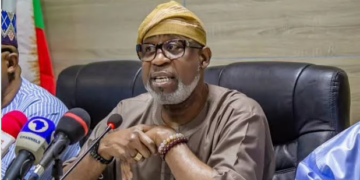Minister of Works, Engr. David Umahi, has declared that it was not yet the turn of the South-East to produce the country’s president in 2027, urging the region to exercise patience and support the administration of President Bola Tinubu to complete its eight years in office.
In an interview with the News Agency of Nigeria (NAN) in Abuja on Sunday, Umahi said the principle of fairness and political continuity demands that President Tinubu be allowed to complete his tenure before discussions about power rotation resume.
“No, it is not our time; it is not the time of the South-East yet,” Umahi said. “We, the 17 Southern governors, went to Asaba before 2023, and we agreed that the next president should come from the South, regardless of political party. All of us tried, but the crown came upon President Bola Tinubu. He is from the South, and so, it is wrong for the South-East to come and say, oh, it is their turn.”
The minister stressed that the Tinubu presidency represents the collective interest of the entire South and should therefore be allowed to run its full course.
“He has to finish the eight years. The eight years he took are for all of us, both the South and the North. So, he has to finish, and when he has finished in 2031, the South-East can now vie, in the sense that they have never tasted the position before,” Umahi stated.
“The North-East too can vie in the sense that they have not tasted the position before. I believe strongly that it is when equity and fairness have been established that equity and rotation will become a thing of joy.”
Umahi acknowledged that the South-East has faced historical political marginalisation, which contributed to the All Progressives Congress (APC)’s poor performance in the 2023 elections in the region, where the party secured just 5.85%of total votes.
“It was very difficult for some of us to deliver the zone for APC in 2023 because of the unfair treatment the South-East people had suffered in the past,” he admitted.
However, the former Ebonyi State governor insisted that President Tinubu has been fair in his dealings since taking office.
“Right now, President Bola Tinubu does not want to know where you come from. He is treating everybody very nicely,” he said. “The South-East might say they did not get a lot of appointments, but the position of the Minister of Works is equivalent to five grade A ministers.”
Umahi listed several major infrastructure projects currently being executed in the South-East under Tinubu’s administration, noting that they far outweigh past political appointments that yielded little development.
He cited projects such as the Enugu–Onitsha dual carriageway (₦350 billion), Port Harcourt–Aba road (₦202 billion), Aba–Umuahia road (₦150 billion), and several others including the Enugu–Abakaliki dualisation (₦183 billion) and the Trans-Sahara road from Ebonyi to the Benue boundary (₦456 billion).
“If the president is doing from Afigbo to Uturu and down to Okigwe cutting through Ebonyi, Abia, and Imo for ₦193 billion through the Dangote tax credits, and he is connecting our bridges between Cross River and Ebonyi, what more can we ask?” Umahi queried.
He further mentioned ongoing works on the Abakpa and Obinago flyovers, and the repair of two failed bridges in Enugu damaged by the 2023 floods, among other projects.
“We have no reason not to be grateful to the president. I do not know what else. And of course, we have the Chief of Naval Staff too,” he added.
Despite acknowledging some “little challenges” with project funding, Umahi assured that contractors had been mobilised back to sites, expressing confidence in the administration’s commitment to deliver on its promises.
“We should be clapping with our hands and legs for President Bola Tinubu,” he enthused. “My appointment as Minister of Works is one appointment too many, not just because of the position, but because of what we have used it to do for the entire country.”
He urged the South-East to focus on consolidating ongoing progress rather than agitating prematurely for the presidency.
“Yes, acknowledge the past,” he concluded, “but let us also emphasise the realities of what is happening now.”




